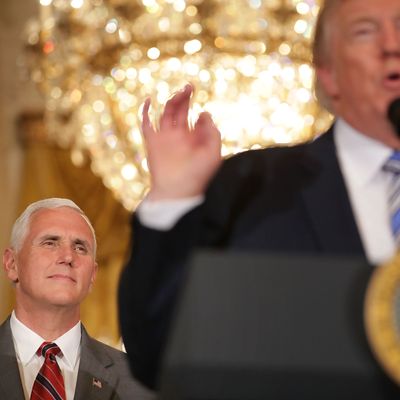
Yesterday, the leading intelligence officials in the U.S. government testified before Congress about Russian efforts to intervene in American elections. Their testimony was bracing. “We have seen Russian activity and intentions to have an impact on the next election cycle,” warned CIA Director Mike Pompeo. “There should be no doubt that Russia perceives its past efforts as successful and views the 2018 U.S. midterm elections as a potential target for Russian influence operations,” said Director of National Intelligence Dan Coats. All of the officials urged taking steps to guard against further attacks.
Today, Vice-President Mike Pence gave an interview with Axios that delivered a very different message. “Irrespective of efforts that were made in 2016 by foreign powers,” he asserted, “it is the universal conclusion of our intelligence communities that none of those efforts had any impact on the outcome of the 2016 election.”
This is unequivocally false. The intelligence community published a formal assessment of Russian interference in January 2017. It concluded that Russia “aspired to help President-elect Trump’s election chances when possible by discrediting Secretary Clinton and publicly contrasting her unfavorably to him.” It took no position on whether this interference had a decisive impact on the election: “We did not make an assessment of the impact that Russian activities had on the outcome of the 2016 election,” the report stated. “The US Intelligence Community is charged with monitoring and assessing the intentions, capabilities, and actions of foreign actors; it does not analyze US political processes or US public opinion.”
If you think about this question, it’s completely obvious that they couldn’t rule in or out the possibility that Russia changed the election outcome. It’s not just impossible for an intelligence agency to determine this. It’s impossible for anybody to determine it. There’s no way to tell what causes people to vote for one candidate, or not at all. Some events seem to move polls one way or another, but even seemingly large movements in polling cannot be pinned down to a single cause with any scientific reliability.
There are certainly many reasons to believe that Russian hacking helped Trump. Some of the hacked emails triggered deep anger by suspicious Bernie Sanders supporters — especially during the Democratic National Convention, when one tranche of emails were released, and during which pro-Sanders demonstrators staged boos and disruptions. The email hacks produced a lot of mainstream stories with headlines about Hillary Clinton and emails, in an environment where emails had become a shorthand for Clinton scandals. And Trump himself cited WikiLeaks well over 100 times (i.e., “The WikiLeaks revelations have revealed a degree of corruption at the highest levels of our government like nothing we have ever seen as a country before.”). If the stolen emails had no effect at all on the election, Trump made a strange choice to emphasize them so heavily.
According to Trump’s own intelligence director, Russia believes that its election maneuver worked. By insisting it did not, and supporting this claim with a provable lie that U.S. intelligence agrees with him, Pence is undermining the case to defend against the next attacks that intelligence officials say are going to come. Why get worked up about foreign intervention in an election if it’s made no difference anyway?
And since the next attacks will almost certainly be intended once again to help Trump and his party, Pence’s lie is inviting another Russian effort to help his party win.






























